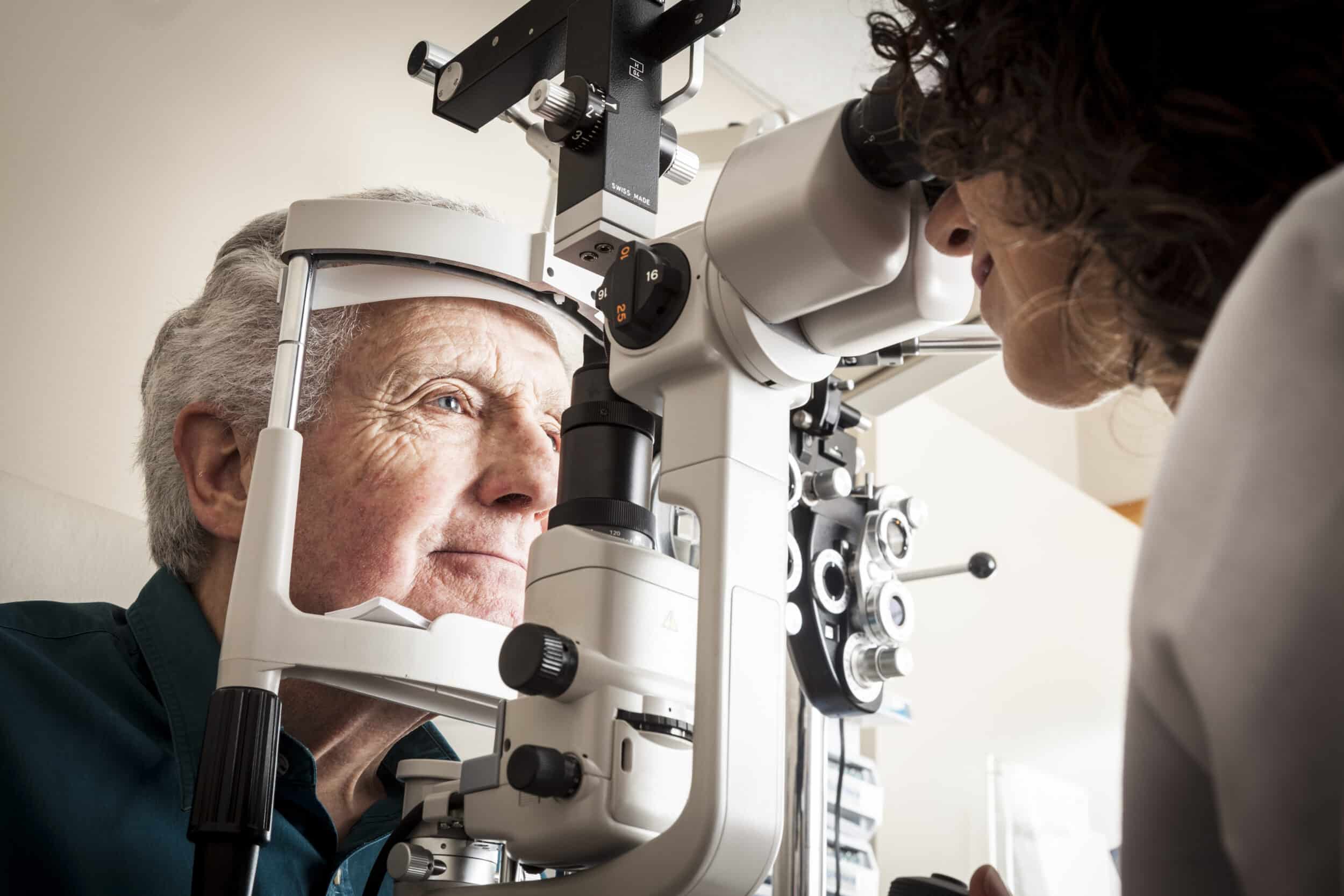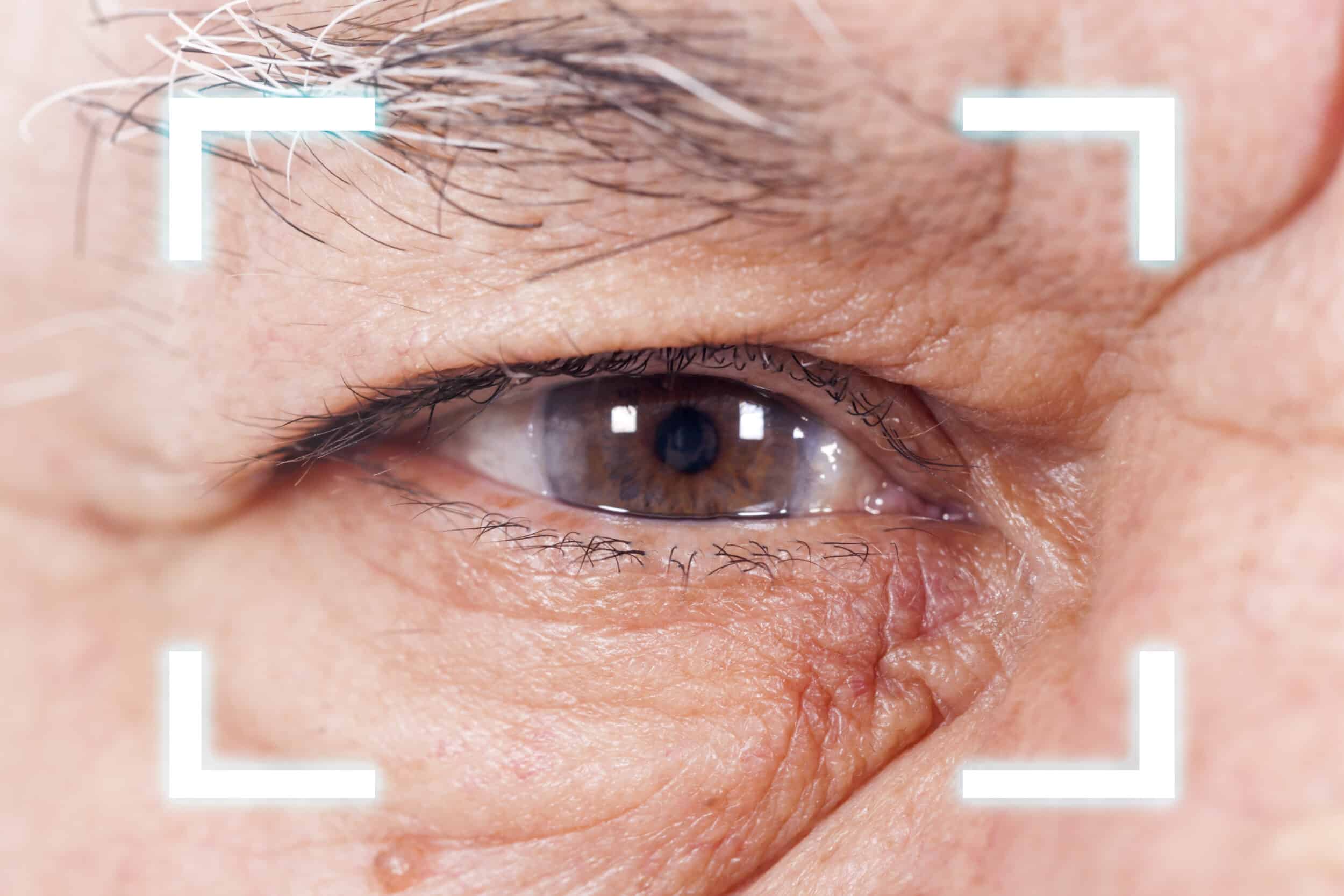What Are Cataracts?
The lens of the eye sits just behind the area of color known as the iris. The lens is like camera film; it takes the light that comes into the front of the eye and focuses it onto the retina to form sharp images of objects. Cataracts form on the eye’s lens as age or other conditions cause proteins within this part of the eye to break down. As proteins clump together, they create a film that clouds vision. Over time, cloudiness worsens, and matter accumulates in the tissue of the lens. Usually, cataracts develop in both eyes, though not at the same rate.

At North Suburban Eye Associates, our team of highly skilled ophthalmologists and optometrists provides advanced care for cataracts throughout the Greater Boston area at our offices in Wakefield, Winchester, and Waltham.
What Causes Cataracts?
Cataracts are actually considered an inevitable part of aging and are widespread among people ages 55 years and older. In fact, half of all Americans have them—or have had cataract surgery—by age 80. In addition to aging, there are some factors that can increase the risk of developing cataracts.
- Natural Aging Process
- Diabetes
- Trauma to the eye
- Prolonged use of Corticosteroids
- Prior Ocular Surgery
- Exposure to Radiation
Symptoms Of Cataracts
Most people who develop cataracts don’t notice their symptoms at first. Eventually, vision will change as a result of buildup on the lens of one or both eyes. Cataracts may cause symptoms including:
- Cloudy or dim vision
- Blurry vision
- Light sensitivity or sensitivity to glare
- Difficulty seeing clearly at night
- Difficulty reading or performing tasks in lower light
- The appearance of halos around lights
- Colors appear yellow or dull
- Eyeglass or contact lens prescription needs to be changed frequently
- Double vision in one eye
Cataract Treatment Near Boston, MA
Cataracts can make it difficult to perform normal tasks and engage fully in life. Fortunately, excellent results are typically expected from cataract removal. Cataract surgery is now a relatively brief (20 minutes or less) operation, which can be performed as an outpatient procedure. Drs. Evans, McNulty, and Barsam perform cataract evaluations at North Suburban Eye Associates. Treatment for cataracts is done at the North Shore Cataract and Laser Center in Stoneham, patients can return home the same day after surgery. Normal activities are usually resumed within a few days.
What Are The Benefits Of Cataract Surgery?
Cataracts can affect how one lives on a daily basis. When clouding and blurriness become severe, a person may no longer engage in activities they once enjoyed. They may avoid driving at night and then avoid driving at all times due to visual challenges. The ways in which poor vision limit activity may lead to struggles with anxiety and depression.
One of the most significant benefits of cataract-removal surgery is that you can get your life back. You can expect to be able to drive and engage in hobbies you may have stopped due to poor quality vision. According to one study, cataract removal surgery can improve quality of life by at least 35 percent.
Studies also suggest that older individuals who undergo cataract surgery decrease the risk of falls and fractures by 16 percent or more. The more severe cataracts are, the greater the percentage of improvement.
Researchers have also found that people who undergo cataract surgery have a greater potential for living longer compared to cataract patients who do not receive vision-improving treatment. A long-term study published in 2013 indicated cataract patients had a 40 percent lower risk for mortality than those who did not undergo cataract-removal surgery.
Who Are The Ideal Candidates For Cataract Surgery?
Adults who are bothered by an inability to see clearly or perform certain tasks due to blurry or cloudy vision may be excellent candidates for cataract-removal surgery. In some instances, it is necessary to investigate the guidelines set by an insurance company in order to qualify for coverage. If insurance is not a factor, a person may choose to undergo cataract removal at any point they deem it necessary to support their quality of life.
How Is Cataract Surgery Performed?
As part of your cataract surgery in the Greater Boston area, your doctor will typically implant a permanent clear plastic lens to correct your vision. Lens implants are small artificial lenses that are placed in the eye, after the cataract has been removed, to minimize dependence on glasses. Today, your doctor is able to offer you the opportunity to have a lens implant that will correct your distance vision as well as your near vision so that you will be able to minimize your need for glasses in order to see at all distances following your cataract surgery. These lens implants are called near vision-correcting lens implants or presbyopia-correcting lens implants. As part of your cataract evaluation, your doctor and the staff will be sure to discuss the possibility of having near vision presbyopia correcting lens implant as part of your cataract surgery.
In the event that you have a considerable amount of astigmatism, it is also possible to correct that astigmatism using a type of lens implant called a toric lens implant. A toric lens implant, or astigmatism correcting lens implant, can help you see clearly at distance without the need for glasses after cataract surgery but does not correct presbyopia or near vision. For those patients who would like to have the best possible distance vision especially for night vision and low-contrast environments such as at dusk or in rainy conditions, it is possible for your doctor to use a monofocal lens implant which works by eliminating spherical aberration.
Following the removal of cataracts during surgery, the implant is placed in a structure called the capsule. After surgery, this capsule remains clear for some time. This capsule often (20% of patients) becomes cloudy following surgery, which can affect the vision. Should this occur, a YAG laser will be used to do a capsulotomy (make a small opening in the capsule) which will restore the vision.

What Is The Recovery From Cataract Surgery?
Recovery from cataract surgery is generally a simple process. There may be a few post-treatment guidelines to follow but patients tend to find them convenient and helpful. In terms of vision, clarity may be restored within a day, a week, or a month. Every patient is unique in their healing. In general, patients may expect:
- To be mindful about rubbing the operative eye, inadvertent touching of the operated eye could disrupt the healing process. The same goes for swimming or washing your face, you should be careful not to get water in the operative eye due to the possibility of bacteria entering the eye.
- To avoid certain activities for one week. The pressure within the eye, called intraocular pressure, can place undue stress on the healing incision. To maintain lower eye pressure, we advise patients to avoid straining, lifting objects that weigh more than 20 pounds, and bending with the head below the midsection of the body.
- To insert eye drops for a few weeks after surgery. Antibiotics may also be prescribed to reduce the risk of infection.
- A follow-up visit a few weeks after cataract removal. This eye exam observes vision and evaluates the potential need for prescription eyeglasses.
Why Choose North Suburban Eye Associates?
The team at North Suburban Eye Associates brings skilled care and advanced diagnostic tools to patients across Wakefield, Winchester, and Waltham. Our board-certified ophthalmologists and optometrists handle everything from routine eye exams to complex conditions like cataracts, glaucoma, and diabetic eye disease. We use advanced equipment to diagnose and treat vision issues, offering a range of services under one roof.
Dr. Douglas Evans and Dr. Charles Barsam specialize in cataract surgery, using the latest intraocular lenses to help patients regain clear vision. They also perform LASIK procedures at Mass Eye and Ear Infirmary. With our experienced providers and personalized care, we’re here to support your vision needs in the Greater Boston area.
Will I Feel Pain During Cataract Surgery?
Your cataract surgery is performed using a local anesthetic, so you should not feel any pain during the procedure. Before commencing with cataract removal, your doctor will insert powerful numbing eye drops, so even the administration of the anesthetic is completely painless. You may also receive a mild sedative to help ease the natural nervousness that can arise. You don't feel pain but you're aware that there is something happening in a part of the face. The numbing medication will wear off gradually after your treatment, paving the way to post-operative soreness or scratchiness. These side effects are usually well-managed with post-operative eye drops provided by North Suburban Eye Associates.
Will Cataract Surgery Eliminate the Need for Eyeglasses?
You may still need to wear eyeglasses after having your cataracts removed, yes. This will depend on a variety of factors, one of which is the specific type of IOL (intraocular lens) you choose to replace the clouded lens. At North Suburban Eye Associates, our doctors carefully assess each case. During your consultation, they can discuss the various options that are appropriate for your needs. We're proud to offer premium Lifestyle Lenses, replacement lenses designed to provide the best clarity of vision across all distances. These premium lenses are made specifically to increase your chances of not needing eyeglasses after your procedure, but not guaranteed.
Can Cataract Surgery be Done on Both Eyes at One Time?
Doctors perform cataract surgery on one eye at a time. This enables the surgeon to thoroughly assess the surgical outcome and, if needed, make adjustments before treating the other eye. There is also a precautionary aspect to this approach, as Cataract surgery is not without risk. There is a slight chance of infection or other complications. Treating only one eye at a time, these risks are easier to manage. Finally, having cataracts in one eye doesn't mean you have them in both. The condition is not "contagious" from one eye to the other. Therefore, you may be ready to correct vision in one eye long before the other eye may develop cataracts significant enough to warrant removal.
Can a Cataract Come Back after Surgery?
The intraocular lens that replaces your clouded lens is impervious to the same conditions that caused cataracts in the first place. You won't "grow" new cataracts. However, there is a condition called "secondary cataracts." This refers to clouding that mimics that of cataracts. It occurs in the treated eye and involves not the lens but the membrane in which the IOL has been situated. "Secondary cataracts" are a condition also known as posterior capsular opacification, and can be treated as needed to restore visual clarity.
How is a Secondary Cataract Treated?
Should your vision become cloudy again after your cataract removal procedure, talk to your doctor. Secondary cataracts are caused by a film that has developed on the capsular membrane around the intraocular lens. A simple laser procedure performed in the office can open the capsule enough to restore clear vision.
Patient Testimonial - Cataract Removal Surgery
"I have been through cataract removal, and about to have laser treatment. I would not go anywhere else. I trust him completely to care for my eyes . The staff is friendly and knowledgeable making me feel at ease. I have referred several people and they have been happy. Thank you N.S.E.A."
How Will My Vision Be After Cataract Surgery?
Advancements in intraocular lens options have improved patient outcomes and provide solutions for common vision problems. After cataract surgery, patients can expect to have a crisp, clear vision and minimal need for prescription lenses, if any.

How Can I Reduce the Risk of Cataracts?
While cataracts are often a natural part of aging, there are steps you can take to reduce your risk. Protect your eyes by wearing UV-blocking sunglasses, avoid smoking, and maintain a healthy diet rich in antioxidants like vitamins C and E. Managing chronic conditions like diabetes and limiting prolonged use of corticosteroids can also help. Regular eye exams will help us detect early changes in your vision and eye health.
Will Insurance Cover Cataract Surgery?
Cataract surgery is typically covered by most health insurance plans, including Medicare, as it is considered a medically necessary procedure. Standard lens implants and basic surgical techniques are usually included in coverage. However, premium intraocular lenses (IOLs) or advanced surgical options may involve additional out-of-pocket costs. Check with your insurance provider to confirm coverage and potential expenses based on your chosen treatment plan, and review our financing options if you think you may need help with payment.
What Are the Risks Associated With Cataract Surgery?
Cataract surgery is generally very safe, but like any surgical procedure, it carries some risks. Potential complications include infection, swelling, bleeding, or retinal detachment, though these are rare and often treatable. Some patients may experience temporary vision issues or a condition known as posterior capsule opacification (secondary cataract), which can be resolved with a quick laser procedure. Your surgeon will discuss these risks with you in your consultation to make sure you feel fully comfortable.
Schedule A Consultation
If you suffer from cataracts and are seeking treatment, contact North Suburban Eye Associates, P.C. Call us at 781-245-5200 or fill out our online form to schedule a consultation with one of our contact specialists. Our practice serves Wakefield, Winchester, Waltham, and the surrounding Boston area.

